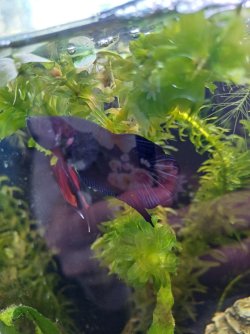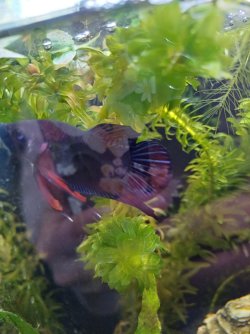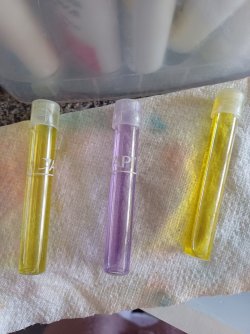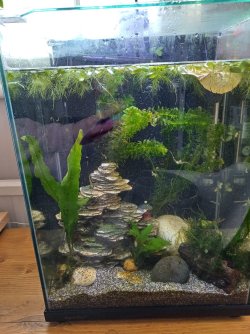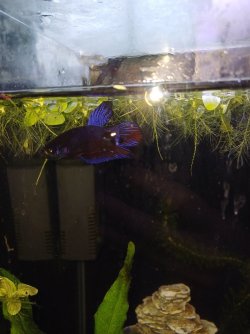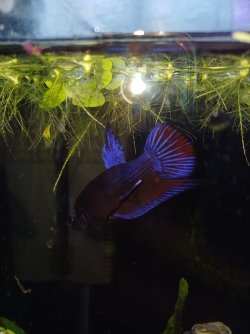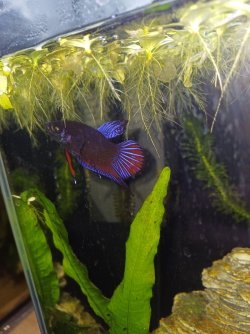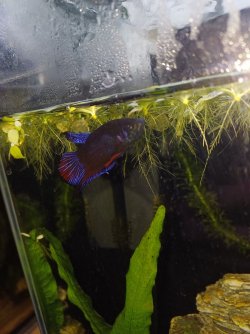Hi all
I've woken up this morning to find my betta Zazu with red inflamed gills and am looking for some advice as to potential causes.
I tested the water and found elevated nitrite (see pics) so I'm not sure if there's been an ammonia spike for some reason? Tank and filter have been established since November, Zazu is the only inhabitant. I've done an 80% water change immediately. Last water change prior to that was 70% on 17/02.
The only thing I've added in the last few days was some new egeria densa as I noticed the existing plant wasn't in the best shape. When I did the water change the existing plant was very brown and disintegrating as I was trying to remove it, so I'm wondering if that could've been a cause of an ammonia spike.
My partner was messing around behind the tank two days ago and I noticed when I did the water change that the filter has become dislodged and I'm not sure if it was working properly.
I do have aquarium salt I can add and also some gill fluke meds but for now I have left things as they are as I don't know what I'm treating. He is still behaving normally, last fed last night and was asking for food this morning but it's a scheduled no-feed day.
Couple of things to add, unsure if relevant, but a couple of days ago I posted the thread below as he had something hanging off him but it seemed to dislodge quickly, no idea if the two things are linked. You can see from the pics in that thread that his gills weren't red.

 www.fishforums.net
www.fishforums.net
The other thing to add is that I've had some sort of parasite in my other tank that I've been treating successfully with gill fluke meds for the last four weeks. I don't share equipment between tanks and given that the treatment is finished in the other tank and has been successful, I'm guessing that it would be very unlikely to have somehow transferred between tanks but thought I should mention it just in case.
Ps the full tank shot was taken right after the water change hence the water not being 100% clear.
I've woken up this morning to find my betta Zazu with red inflamed gills and am looking for some advice as to potential causes.
I tested the water and found elevated nitrite (see pics) so I'm not sure if there's been an ammonia spike for some reason? Tank and filter have been established since November, Zazu is the only inhabitant. I've done an 80% water change immediately. Last water change prior to that was 70% on 17/02.
The only thing I've added in the last few days was some new egeria densa as I noticed the existing plant wasn't in the best shape. When I did the water change the existing plant was very brown and disintegrating as I was trying to remove it, so I'm wondering if that could've been a cause of an ammonia spike.
My partner was messing around behind the tank two days ago and I noticed when I did the water change that the filter has become dislodged and I'm not sure if it was working properly.
I do have aquarium salt I can add and also some gill fluke meds but for now I have left things as they are as I don't know what I'm treating. He is still behaving normally, last fed last night and was asking for food this morning but it's a scheduled no-feed day.
Couple of things to add, unsure if relevant, but a couple of days ago I posted the thread below as he had something hanging off him but it seemed to dislodge quickly, no idea if the two things are linked. You can see from the pics in that thread that his gills weren't red.
What's this on ny betta
I don't think this is an emergency but I noticed this on my betta this morning. It almost resembles a flap of skin (which I know it wouldn't be but that's the only way I can describe it). Sorry the pictures aren't great as he doesn't keep very still! Ph - 7.5, ammonia, nitrite and nitrate all...
 www.fishforums.net
www.fishforums.net
The other thing to add is that I've had some sort of parasite in my other tank that I've been treating successfully with gill fluke meds for the last four weeks. I don't share equipment between tanks and given that the treatment is finished in the other tank and has been successful, I'm guessing that it would be very unlikely to have somehow transferred between tanks but thought I should mention it just in case.
Ps the full tank shot was taken right after the water change hence the water not being 100% clear.

